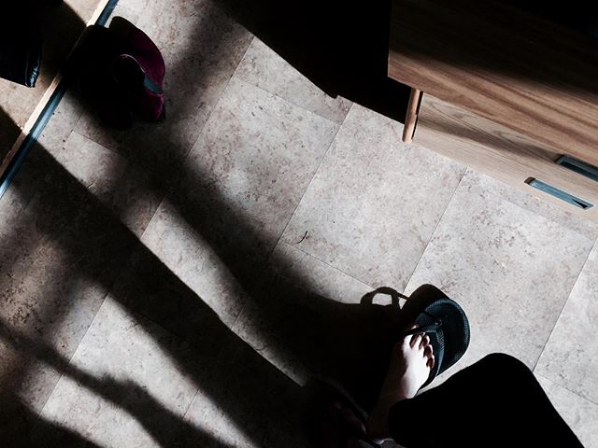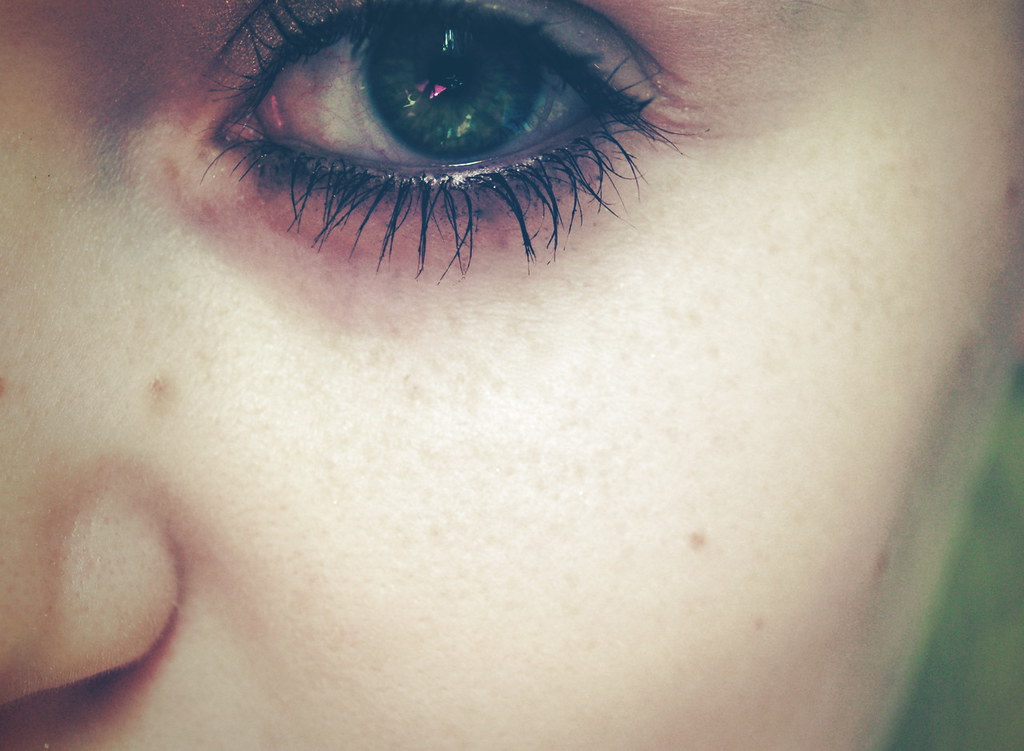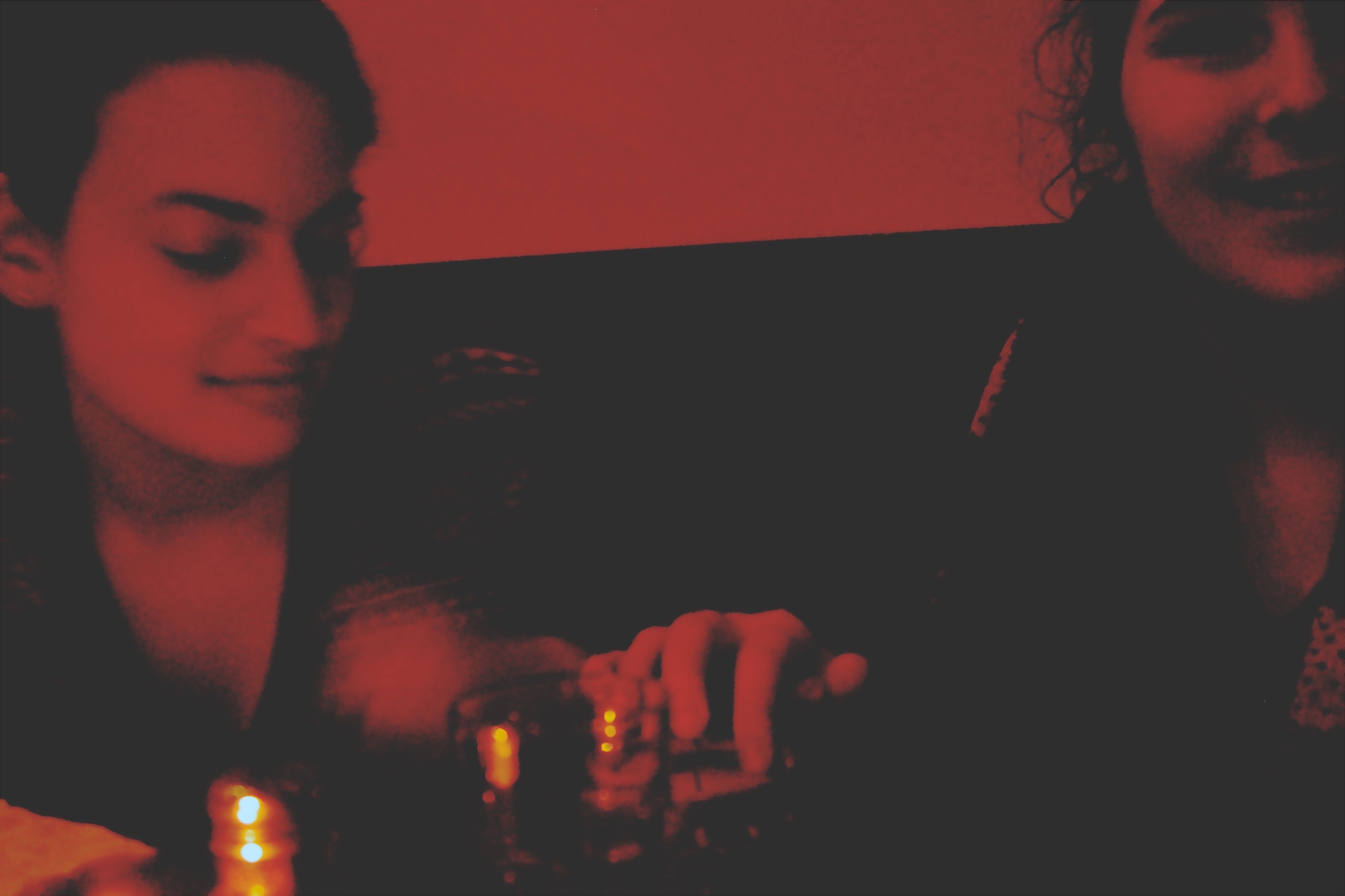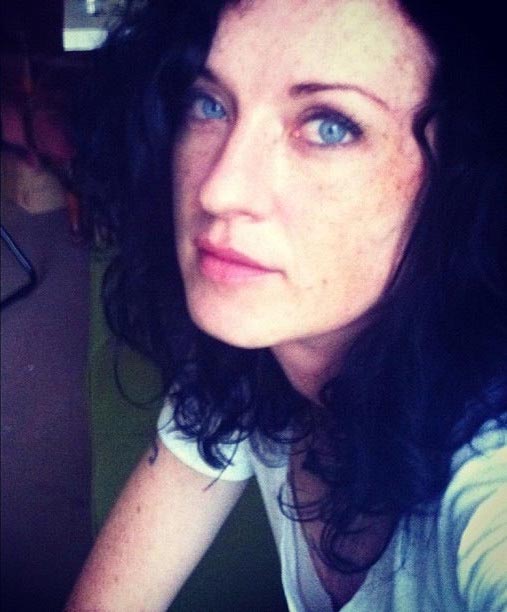Essay by Molly Correll
Abortion Is Never an Easy Decision

About a week before my bed was ready at New Hope, I worked out, with my psychiatrist, the final decision about my pregnancy. I had to terminate.
Benedictine would discharge me, even if they knew I was coming back within a day or two. At the time, it was still a Catholic hospital, so they couldn’t officially sanction this, let alone have one of their doctors perform the operation. But before my discharge, they had to give me a sonogram to make sure both I and “the baby” were in good health.
The psych nurse, a robust, red-headed Irish woman named Wendy, held my hand in the elevator on my way to the procedure. She knew I wasn’t keeping it.
“Don’t look when they do this. Don’t let the tech tell you anything about it.”
I said nothing. All I could think of was my mom.
The tech met me on the pediatric floor. They required me to sit in a wheelchair, because my blood pressure kept dropping, and I was still fainting. He was a small Asian man with a pleasant face and kind smile. He took the wheelchair and dismissed Wendy.
I was in my late twenties then, in the early 2000s, in a community hospital in upstate New York. I wanted to pretend I was okay, that it was a happy day and I was there for a better reason. I closed my eyes and imagined this tech did not know I’d just come from psych, that I didn’t have the brightly colored wristbands indicating drug dependency and psychiatric issues. I wanted so much for a loving husband to be waiting for me or to have someone to share this with, as if I wanted this baby, and the father was a good man. I wanted not to have fucked up.
The tech didn’t know I was going to terminate. The arrangements I’d made with a few nurses and my psychiatrist couldn’t be on any document. So, when the tech asked me if I was excited, I smiled, not sure what to say and not wanting to tell him anything.
“Are you scared?”
“Kind of.” My hands shook. I nervously wrung my fingers.
“Do you have other children?” He was sincere and wanted to encourage me. I just wanted him to stop asking questions.
“No, no children.”
He put that awful jelly on my stomach and watched the screen while he moved the wand across my abdomen. “Well, the little one looks very healthy, good heartbeat. You know, it will all just come to you. You’ll do just fine.” He smiled, punched a button, and I heard printing.
I said nothing. My eyes watered, and I turned my head away. On the wall was a poster, in a cheap plastic frame, of a kitten gripping a metal bar.
“It’ll be okay. It’s normal to be scared—here, you want to see?” he asked.
Before I could say anything, he turned the monitor in my direction, and I looked. He pointed out the heartbeat, the eyes and the little toes. “You’re about eleven weeks in.”
Further along than I thought. I smiled at him; I didn’t want him to know I was going to kill it. I didn’t want him to judge me.
He handed me what he’d printed. “Look, your first baby picture.”
I took it. I looked at the little spine and the big, weird head. “Thank you.”
He left the room, and I wiped the jelly off my stomach. I took off the gown and put on my sweatpants and T-shirt. I folded the picture carefully so that I wouldn’t put a crease along any part of the actual baby. So I could hide it in my pocket.
He wheeled me to the elevator, and Wendy was there. She looked at my face, my eyes, and knew I’d seen it. Her mouth pinched up, and her brow came down.
She rested her hand on my shoulder, and I began to sob.
• • •
As soon as we reached the ward, I got out of the wheelchair and went to my room. I curled up on the bed and pushed my face deep into the pillow. My whole body heaved. I pulled the blanket up over my head. My stomach felt empty, and my head was pounding. My hands went down around my stomach, and I held my belly. It was still a little sticky-slick from the jelly. I squeezed it. I pushed it in, trying to feel where it was. I punched it and gripped it, trying to mush the thing. I sobbed harder.
Wendy came in and told me she’d held dinner for me. I knew she wanted to tell me I shouldn’t have looked, that she told me so, but she said nothing. I stayed under the blanket. I could feel her there, standing, looking at me.
“You should get up and wash your face and come sit with me at the nurses’ station. You can eat there, if you want. We can play cards.” She touched my toe. “I’m working overnight, too.”
“Okay.” I knew I would get up; I always do. But I needed more time. I had to get this out, to cry, to be absolutely devastated. I heard her leave.
I pulled the picture out of my pocket and adjusted the blanket for just enough light. I traced it with my finger. I said I was sorry and sobbed more. I knew I couldn’t keep it. I couldn’t even handle being pregnant, let alone care for a baby. I knew Brian would try to get it—he wouldn’t succeed, not after what he’d done to me—but his mother might. She was a church woman, with a lot of pull in Woodstock, New York, and would give him access to the child.
My parents were struggling financially and had their hands full already, raising two preteen daughters, my half-sisters. My dad said he would support me either way, and I knew it grieved him horribly.
I lay there for a while with my eyes closed and drifted. I thought about New Hope Manor, a residential treatment rehab for women with dual diagnoses, and hoped it would work out, that I’d get a bed. I wanted nothing more than to be in their lovely woods with no men. Just a bunch of women in recovery, for as long as it took to be better.
I got up and washed my face. We had no pushpins, of course, so I taped the picture to the back of a drawing from my sister. I couldn’t bear to throw it away. I knew if Wendy or another nurse saw it, I’d be questioned.
I put on my slippers and went out. Wendy had a chair and my dinner waiting. I was treated a little differently—not better, but they knew I was at a turning point. They talked with me as if they had hope for me. I didn’t cut myself or talk to the wall or go on about what Jesus told me to do. I could hold up my end of a conversation. I ate my dinner, and we played cards until I couldn’t keep my eyes open.
The next morning, I looked for the sonogram picture, but it wasn’t there. I checked it first thing, as if I knew it would be gone. When Wendy started her shift that night, she came to my room.
She pointed at where the picture had been. “You can’t keep that. It’s not good for you.” And she walked out.
I don’t know how she knew where I'd taped it, but I’m glad she did. She was right. Whether she meant the picture, or the baby, too, I still don’t know. It doesn’t matter.
• • •

They discharged me a few days later. I was lactating a little already and running out of time. Deb, my stepmother, was waiting outside and took me straight to the clinic. It was downstate in New York, the only place I could get into near the end of the first trimester. It wasn’t Planned Parenthood.
This was abortion day, and the big waiting room was packed. All the seats were taken, so some women were sitting on the floor. A few wide-eyed boyfriends stood quietly in corners, next to their women, and looked zoned, always looking away. The demonstrators outside had the most awful posters, but inside, it was the faces that made me sad.
I filled out the paperwork and went over to the intake receptionist behind her bulletproof glass. I slid it through, in one of those bank drawers, for her to open from the other side. Deb was uncomfortable, but she held my hand and made small talk.
They called my name. An annoyed-looking nurse was standing with the receptionist, talking back and forth, looking at my papers. “You know, you’re late-term, so you need special permission from Social Services for this. Medicaid won’t pay otherwise.”
“I have approval. Call Phyllis at Ulster County Social Services. She approved it.” I gave them her number and sat down. I was lucky. My caseworker was the head of UCSS and had stayed in my corner, even after I fucked up again.
We waited.
They called my name. They took me back, and I met with an intake screener. It’s mandatory, to make sure you understand your options and that nobody else is forcing you to do this. Before she could go into her speech, I told her I was in the process of getting a restraining order against the father, who had burned me and held me captive. I had police reports and had been hospitalized. Planned Parenthood had helped me escape, I told her, and yes, I understood this was late-term, but I hadn’t been free to get here until now.
She sent me back to the waiting room, and I sat with Deb. About half an hour later, they called me again along with a dozen other women.
Deb squeezed my hand. “You know, now you’re almost done. Next thing you know, we’ll be going home, and the worst will be over. You’re doing the right thing.” She smiled for me.
“Thank you. I know.” She was right, and I needed practical at that moment. I couldn’t afford to break down.
• • •
We were herded into little cubbies and handed paper gowns. There was little privacy between us, and we could hear every sound the others made. A girl was crying, but mostly it was just the noise of clothing dropping to the floor and paper gowns rustling over skin.
When I was done, I opened one side of the curtain and stepped out. Most of the women were changed and held their belongings. We were then given plastic garbage bags to put our things in and had to follow a nurse to a long room. There were twelve hospital beds lined up, each with stirrups, stools, and IVs; thin, too-short curtains hung between each bed. A doctor sat on a stool at the far end of the room. The stool had wheels, and there was a stack of buckets next to him. He was joking with a tech.
“It’s like a factory,” I murmured. The woman behind me snorted.
A tech called out our names, and we were directed to beds. The curtains were pulled as we lay down.
I had to be put under, because of the late-term. The anesthesiologist was a pinch-faced Asian woman with no eyebrows. She rattled off questions I had already answered in the paperwork as she put the butterfly in my arm.
When she asked if I did drugs, I told her I had quit months before. She asked what drugs; I told her cocaine.
“What, you are addict?” She was yelling.
The doctor slid into view on the stool. He never even stood up; he just rolled from the last girl to me. A bucket was handed to him, and he put it on the floor between my legs. My legs felt heavy in the stirrups.
“Slide your butt down farther,” he said.
The drugs hit. All went black.
When I came to, I was cold and lying on a gurney. All the women I went in with were now side by side in a recovery room. I tried to sit up and got dizzy. A nurse came over and squeezed an IV bag. “Your blood pressure is low, girl.”
She put juice and a few cookies next to me on the small swivel table and left. I looked over at the woman next to me—just a girl, maybe eighteen. She was crying.
“Hi. What’s your name?” I slurred.
“What?” She looked surprised that I was talking to her. “Sonia.”
I put my hand out, and she took it in hers. “My name’s Molly. Sonia. It’s going to be okay. You did the right thing. It’s okay.”
She shuddered, a leftover, been-crying-real-hard-for-days, deep-breath, exhausted kind of shudder. “I’m cold.”
“Me, too.”
She squeezed my hand. “I got in to college. I couldn’t go, if I had it. My boyfriend never would have let me go. I didn’t tell him, but I know. He wouldn’t.”
“That’s okay, one day you’ll be ready. And you’ll have gone to school, and you’ll be a good mom.” I smiled. “You know, you’re okay.”
“Yeah.”
We went quiet. We lay there, holding hands across the narrow aisle between our beds, shivering and cold.
The cramps came in waves, but eventually she let go of my hand and sat up. I drank the juice. The nurse came over. She squeezed the bag and looked at the IV. “When this is empty, you can go.”
• • •
Back in the waiting room, Deb was there, a big warm smile on her face, and she walked me out to the car. I was still bleeding and uncomfortable. We stopped on the way and got some lunch to go. As soon as I got to my parents’ house, I curled up on their oversized pajama chair in the living room. I tucked one of Deb’s homemade quilts around my face.
I think my dad brought me tea. He handed me the remote and asked if I wanted to watch a movie. I closed my eyes and pulled the blanket up over my head.
“I love you, sweetie,” he said.
I thought of that little picture. Curled up under the quilt, my eyes closed, I remembered the little toes. I drifted off.
The next day, my dad drove me back to Benedictine to the emergency room. According to plan, I checked in by telling them I was suicidal. I had to wait for the bed at New Hope, and the psych ward was the safest place for me; I still didn’t have the restraining order. My bed and room were there, untouched. Wendy was waiting for me on the ward.
“Missed ya, kid. You good?” She handed me Ibuprofen in a little paper cup and water. “For the cramps.” I went back to my room and went to sleep.

Afternote by Greg Correll
My daughter Molly’s life after New Hope was a steady rise, both personally and professionally. She inspired her parents and her sisters, showing how tough perseverance, moral choices, and compassion can transform us. In late 2017, she was diagnosed with a rare cancer, adenoid cystic carcinoma (ACC), that spread into all organs. In July 2018, she died in home hospice, her family at her side and holding her as she passed. She fought it all the way, and we were with her, all the way.
Molly wrote extensively about her life and authorized specific pieces to be published posthumously, including this one. The names used in this essay are pseudonyms.
Art Information
- “Las Sombras Aclaran la Luz (Shadows Clarify Light),” “Breathing in Snowflakes,” and “Sauce” © Sarah Simon; used by permission.
 Molly Correll was born on the Bicentennial—July 4, 1976—and she was a firecracker her whole life. A Ford model at seven, she appeared in Big with Tom Hanks, as a dancer in Francis Ford Coppola’s segment of New York Stories, and worked as an extra with Woody Allen—all before she was ten. As an adult, she overcame personal difficulties to work in management at Mohonk Mountain House in the Hudson Valley for five years, then various management positions at Whole Foods in New York City. She was also a jeweler, visual artist, and writer, and won several Editor’s Picks at Open Salon for her brave personal essays.
Molly Correll was born on the Bicentennial—July 4, 1976—and she was a firecracker her whole life. A Ford model at seven, she appeared in Big with Tom Hanks, as a dancer in Francis Ford Coppola’s segment of New York Stories, and worked as an extra with Woody Allen—all before she was ten. As an adult, she overcame personal difficulties to work in management at Mohonk Mountain House in the Hudson Valley for five years, then various management positions at Whole Foods in New York City. She was also a jeweler, visual artist, and writer, and won several Editor’s Picks at Open Salon for her brave personal essays.
